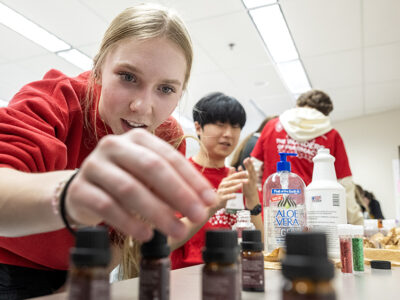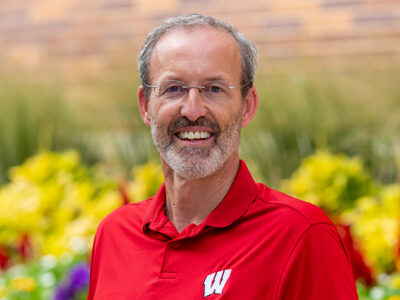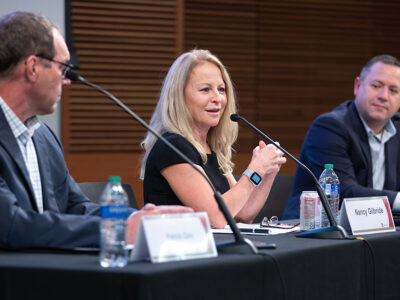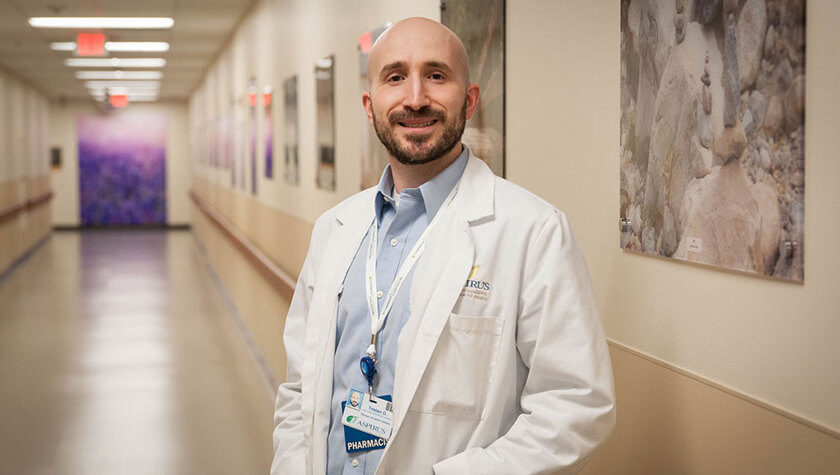
6
June

Tristan O’Driscoll, alumnus of the dual PharmD/MPH degree program, leads a health system into the era of antimicrobial stewardship
By Katie Ginder-Vogel
Photos by Brian Kowalski
Tristan O’Driscoll was raised in inner-city Milwaukee, in a family and community impacted by poverty and drug abuse.
“I had seen the power drugs could have — good and bad — firsthand, through my family experiences,” he says. “I knew from an early age that they could be powerful tools.”
O’Driscoll (BS ’07, PharmD ’13, MPH ’13) was primarily raised by his grandparents, and he fondly remembers watching Agatha Christie movies with his grandmother, which is one of the early experiences that led him into the career he has today.
“Agatha Christie was a nurse, then a pharmacy assistant, who dabbled in toxicology, and that really resonated with me,” he says. “I also remember reading news stories in high school about well-paid jobs that required extensive training, like being a pharmacist.”
He followed those interests to earn three degrees from the University of Wisconsin–Madison School of Pharmacy: first a bachelor’s degree from the Pharmacology and Toxicology program and a dual PharmD/Master’s Degree in Public Health (MPH), offered in collaboration with the UW School of Medicine and Public Health (SMPH). He credits this solid, multilayered education with helping him develop into a national leader in antimicrobial stewardship.
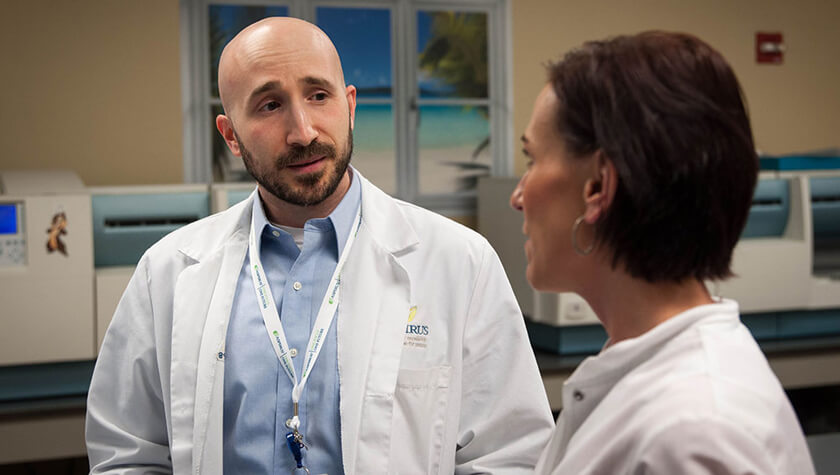
Today, O’Driscoll is the system antimicrobial stewardship coordinator at Aspirus, which has eight hospitals and 50 clinics in Northern Wisconsin and the Upper Peninsula of Michigan. He joined Aspirus as an infectious diseases pharmacist almost three years ago, where he laid the foundation for the System Antimicrobial Stewardship Program, which he now leads.
“I’ve hit where I want to be, leading a stewardship program in a community like mine,” he says. “I can give back to my community for all the aid I received and affect health outcomes in this whole area.”
He still does daily patient rounds and chart reviews and makes recommendations to providers, but he spends most of his time leading the stewardship program, which includes tracking and reporting on antibiotic use, educating providers and staff, implementing best practices, helping with infection control, and leading collaborative efforts with other health systems.
“The dual PharmD/MPH degree program gives future practitioners the tools they need to improve the health of the communities they serve in two ways: through one-on-one patient interactions as well as at a population level,” says Mary Hayney, professor in the School’s Pharmacy Practice Division who helps coordinate the dual degree program. “These graduates, like Dr. O’Driscoll, are uniquely positioned to influence both policy and practice, in response to widespread health concerns.”
Driven by concern for the public good
“From early on, I knew I wanted to get out and improve things for my community,” O’Driscoll says. “I look at my community and work to impact outcomes by focusing on public health.”
After beginning his undergraduate career at UW–Madison, he quickly realized he wanted to learn more about how drugs impact the body and do bench work in a lab, so he applied to the PharmTox program and was accepted.
“I can give back to my community for all the aid I received and affect health outcomes in this whole area.” –Tristan O’Driscoll
“The coolest thing was lab work — getting hands-on and seeing for yourself how things work,” he says. “The best lab was when we conducted genetic testing on ourselves. Now, genetic testing services are readily available, but at the time, we were privileged, as PharmTox students, to be able to do it.”
During this testing, the PharmTox students took cheek swabs from each other to look for drug-metabolizing enzymes that affect how effective drugs will be for people. For example, if you’re a poor metabolizer of CYP2D6, you won’t have the right enzymes to convert codeine from a prodrug to an active compound of morphine, so it won’t give you pain relief.
“I was a poor metabolizer, which set me apart from the rest of the group,” says O’Driscoll, laughing. “UW–Madison is an incredible school that allowed me to discover things on my own and do some undergraduate research to earn work/study money,” he says.
‘You are the future of pharmacy’
After earning his bachelor’s degree in PharmTox, O’Driscoll worked as a bench scientist at PPD, a Good Manufacturing Practice (GMP) pharmaceutical product development company in Middleton, Wis., for three years.
“The work was challenging and interesting, and I needed to be methodical, detailed, and organized — skills I would later need in public health,” he says, including a focus on quality improvement and testing.
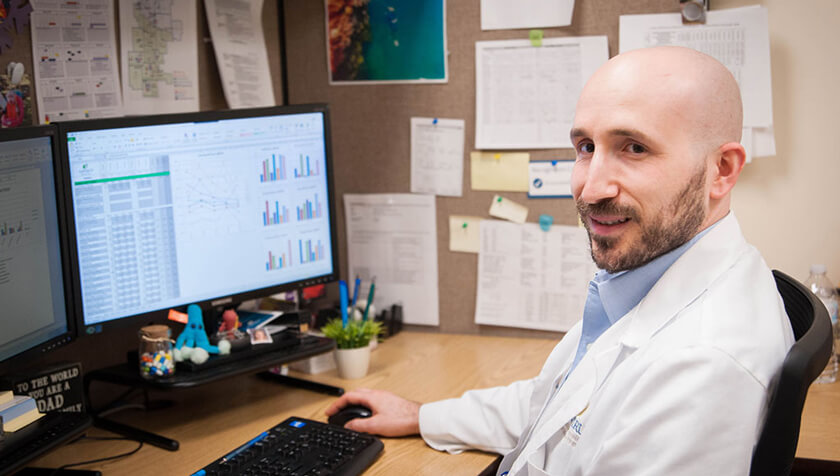
But he knew that industry wasn’t where he wanted to be long-term — he found he wanted to use his skillset to focus on larger public health issues in the surrounding community.
“I wanted to get into health care and interact with more people to affect health outcomes,” he says, so he applied for the dual-degree PharmD/MPH program at the UW–Madison School of Pharmacy, which took him four years. To complete the requirements of the program, he had to forgo some opportunities — such as pharmacy electives and community outreach — but encourages others to follow in his footsteps.
O’Driscoll’s mentors include Hayney and Associate Professor Warren Rose of the School’s Pharmacy Practice Division, as well as UW Health pharmacist Lucas Schulz (PharmD ’08). Hayney and Rose both hold MPH degrees.
“Students with a PharmD/MPH dual degree often want to pursue a career in a clinical setting, but many see the value of better understanding the ‘bigger picture’ of health care in order to best perform in their future careers,” says Mindy Schreiner, MPH student services coordinator at SMPH. Graduates also often use the degree to move into research within a population-based health framework, like the role O’Driscoll carved out for himself with Aspirus.
O’Driscoll entered the program with a focus on critical care and infectious diseases, and during his time as a student, he watched the landscape rapidly evolve.
In 2014, the Obama administration introduced a national strategy to combat antibiotic resistance, and in 2016, the Centers for Disease Control required hospitals to adopt antimicrobial stewardship programs. With this expectation, many more pharmacists began to pursue public health training. “It lends itself to any type of pharmacy in a hospital setting, which is huge,” O’Driscoll says.
“We have to take a public health approach to global antibiotic resistance to make changes for the better.” –Tristan O’Driscoll
“The progression toward all hospitals seeking to have a stewardship position came when I was an infectious diseases resident at Midwestern University, Chicago College of Pharmacy,” O’Driscoll says. “That changed everything. It was the perfect setup for me.”
During his residency, Northwestern hosted School of Pharmacy Professor Emeritus and former Director of Pharmacy at UW Hospital and Clinics David Zilz (BS ’62, MS ’64) as a speaker.
“He asked the audience who had both an MPH and a PharmD degree, and I was the only one,” recalls O’Driscoll. “He said, ‘You are the future of pharmacy.’”
Spearheading stewardship
After completing his pharmacy residency, O’Driscoll was hired by the Carolinas HealthCare System in Charlotte, NC (now Atrium Health), as a clinical pharmacist focusing on infectious disease and antimicrobial stewardship. He worked closely with physicians to optimize care for patients suffering from difficult to treat conditions like methicillin-resistant Staphylococcus aureus (MRSA).
This experience gave him a clearer mission for his career: determining how to most effectively use antibiotics in targeted ways, to keep the human microbiome as intact as possible and decrease the likelihood of antibiotic resistance.
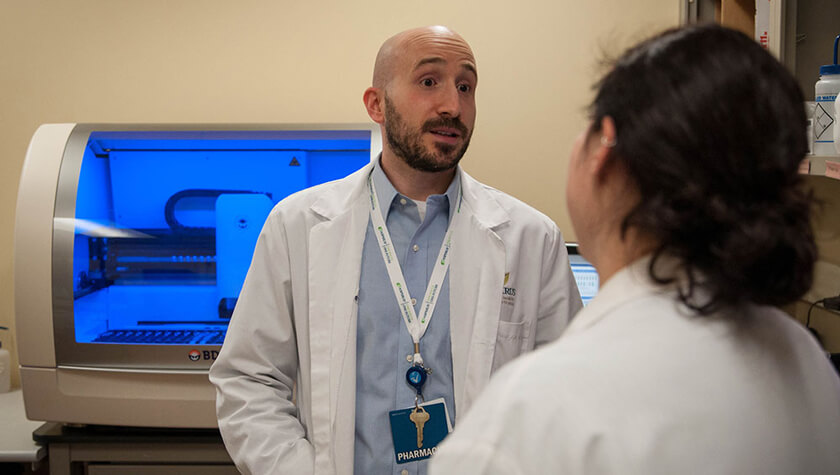
“Once I realized the bigger impact I could have, I transitioned from focusing on one specialty area of pharmacy, like infectious disease, to this new quality initiative, called stewardship, that’s bigger and can yield broader outcomes,” explains O’Driscoll.
In his current role as the stewardship program coordinator for the entire Aspirus health system, he can touch multiple areas of patient care. He networks with others in similar roles throughout Wisconsin and in his residency networks in Chicago and Charlotte, sharing the latest research and best practices and talking about how to implement promising initiatives in specific patient communities.
He is aiming to grow Aspirus’ stewardship program and develop it into an influential statewide entity, like UW Health and Gunderson, he says.
“As a leader of a stewardship program, quality improvement is a huge focus of my position, and the dual degree set me up for success,” he says. “Evidence-based medicine is a key principle, and we have to take a public health approach to global antibiotic resistance to make changes for the better.”
O’Driscoll regularly returns to the School of Pharmacy, to talk with students about his experience in the dual PharmD/MPH degree program and the career possibilities it enables, as well as to encourage future pharmacists to look at the bigger picture of patient health.
“We have so many areas we need to focus on to continue to improve care, and I want to see more people come in, from all disciplines, who are hungry for this new approach,” he says. “Throwing antibiotics at everyone is harmful, and we can do way more with less.”
Learn more about the School of Pharmacy’s dual PharmD/Master’s in Public Health degree.





